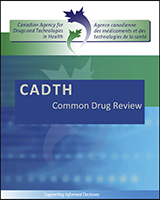Results of one randomized controlled trial indicated that selexipag is associated with clinically and statistically significant improvements in time to clinical worsening (composite outcome) compared with placebo in patients with PAH on a heterogeneous background of PAH therapies or no PAH therapy. There were no clinically significant improvements observed in the 6MWD test for selexipag compared with placebo. There was no clear evidence of improvement observed for selexipag compared with placebo for overall deaths, PAH-related deaths, hospitalization rates, WHO FC changes, quality of life, symptoms of PAH, breathlessness, or dyspnea.
Based on the results of GRIPHON, some patients would be expected to discontinue selexipag due to headache, diarrhea, or nausea. Adverse events associated with prostacyclin use are more likely to occur during the dose-adjustment phase compared with the maintenance phase. These include headache, diarrhea, nausea, pain in jaw, myalgia, pain in extremity, vomiting, and flushing.
A number of important gaps in information remain. The presence of different background PAH therapies, or no PAH therapy, in the trial population creates uncertainty regarding the generalizability of the data from the GRIPHON study. There was no evidence identified that allowed an assessment of the relative effects of selexipag to other oral PAH therapies or prostacyclin therapies.

